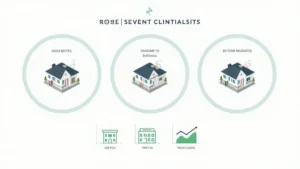Introduction
Dubai has emerged as a global hub for real estate investment and innovation, attracting billions in investments annually. But with the staggering amount of money involved—$4.1 billion lost in cryptocurrency hacks globally in 2024—transparency and security in transactions have never been more crucial. With the advent of blockchain technology, the Dubai real estate market stands at a transformative juncture, and this article dives deep into various blockchain case studies that showcase its potential.
The Rise of Blockchain in Real Estate
Blockchain technology has been disrupting traditional methods across various industries, and real estate is no exception. Therefore, understanding how blockchain streamlines property transactions, increases security, and enhances credibility is essential when looking at Dubai’s real estate landscape.
- Eliminates counterparty risk—ensures that all transactions are recorded on a secure and immutable ledger.
- Enhances transparency—provides every stakeholder access to transaction histories.
- Reduces transaction costs—minimizes the need for intermediaries, thus speeding up the process.
Diverse Use Cases
Several projects have emerged in Dubai that harness blockchain to revolutionize real estate transactions, demonstrating its effectiveness. Let’s break down some notable case studies.

Case Study 1: Dubai Land Department’s Blockchain Initiative
The Dubai Land Department (DLD) took the initiative to integrate blockchain technology into its services. The aim is clear: to create a paperless and digitally secure environment for real estate transactions. As of 2025, Dubai aims for 100% of its transactions to be conducted on a blockchain network.
According to data from the DLD, this has already led to a reduction of about 10% in transaction times and costs, setting new standards for speed and efficiency in the sector.
Key Features:
- Comprehensive onboarding systems—allowing buyers and sellers to transact seamlessly.
- Real-time tracking—of property ownership and history.
- Security enhancements—by encrypting sensitive data.
Case Study 2: Smart Dubai and Property Tokenization
Smart Dubai has launched initiatives promoting property tokenization. This innovative approach allows for fractional ownership, enabling investors to own a portion of high-value properties easily.
In a market where property prices can skyrocket, tokenization opens doors for smaller investors. For example, a luxury apartment in Downtown Dubai valued at $3 million can be tokenized and sold to 300 investors at $10,000 each.
Benefits of Tokenization:
- Lower entry barriers for investors—making the market accessible to a wider audience.
- Enhanced liquidity—by facilitating easier buying and selling of property shares.
- More transparent investment—through verifiable ownership records on the blockchain.
Case Study 3: Real Estate Platforms Utilizing Blockchain
Real estate platforms like Hibt have embraced blockchain to enhance their operational capabilities. These platforms integrate blockchain to verify property titles, ensuring that ownership records remain tamper-proof.
Statistics reveal that platforms using blockchain technology report a 15% decrease in property disputes due to transparent transaction records that users can trust.
What Sets This Apart:
- Automated Smart Contracts—reducing human error and expediting transactions.
- Verification checks—monitoring compliance with real estate regulations.
- Enhanced investor confidence—boosting property valuation and sales.
The Future of Blockchain in Dubai Real Estate
With blockchain becoming more entrenched in Dubai’s real estate sector, the future looks promising. As the city aims to be the world’s most innovative hub for blockchain in real estate by 2025, many stakeholders are expected to benefit from enhanced transaction security, lower costs, and greater efficiency.
Furthermore, as reports indicate a 20% yearly growth in the number of blockchain users in Vietnam, we can anticipate more global players entering the Dubai market as they seek secure methods for real estate investments.
Challenges Ahead:
- Regulatory compliance—navigating local laws and regulations can be complex.
- Technological integration—ensuring existing systems collaboratively work with blockchain.
- Market education—bringing awareness to stakeholders about the advantages of blockchain technology.
Conclusion
In conclusion, the integration of blockchain technology into Dubai’s real estate sector is revolutionizing how transactions are conducted. From the Dubai Land Department’s initiatives to individual platforms pioneering tokenization, it’s evident that the benefits of blockchain cannot be overstated.
The experience gained from various case studies lays a robust foundation that ensures the lasting impact of blockchain on real estate. For anyone looking into investment opportunities, particularly in burgeoning markets such as Vietnam, understanding these principles—alongside the importance of tiêu chuẩn an ninh blockchain—will be vital.
With the expected transformative changes in the workflow, stakeholders can confidently harness blockchain for greater transparency and security in real estate transactions as they navigate the complexities of today’s digital landscape. Visit bitcoincashblender for more resources.
Expert Author: Dr. Alex Thompson, a blockchain and real estate consultant with over 15 publications on real estate technology, has advised on landmark projects in Dubai, pushing for transparency and efficiency in the real estate markets.











